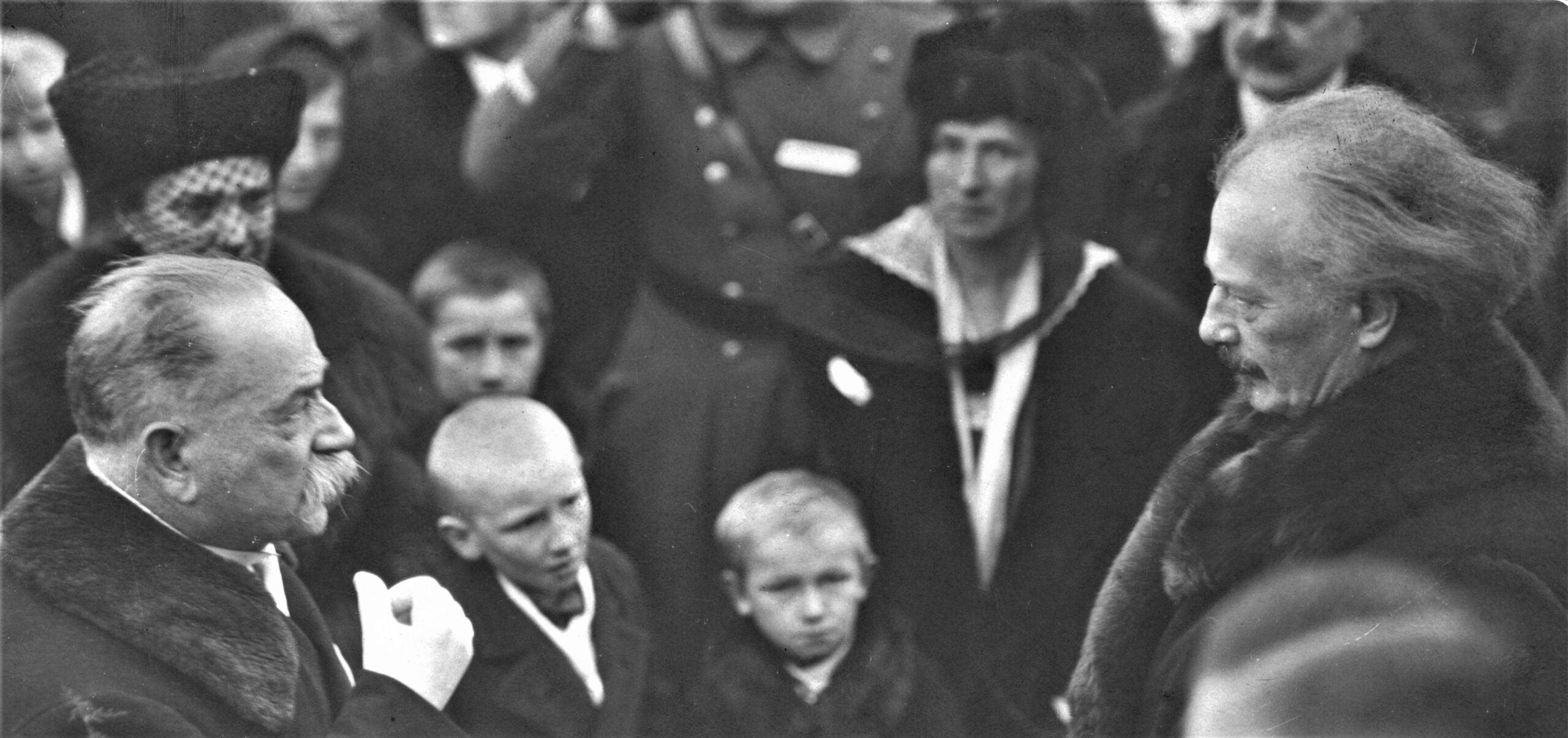The Paderewski government included a number of politicians and experts whose reputation and skills were now crucial to continuing Józef Piłsudski’s strategy. The government was established on 16 January 1919 and quickly gained the support of the countries of the victorious Entente.
by Wojciech Roszkowski
Instead of cracking down on rightist opposition, Piłsudski began talks to negotiate the reconstruction of the government. On 5 January, at night, his envoy Gen. Szeptycki appeared in Cracow’s Grand Hotel, where Paderewski was staying, and invited him to the Belvedere. Meanwhile, the Dłuski mission to Paris proved successful: a joint action was initially agreed upon involving the government in Warsaw and the Polish National Committee.
On 7 January, all coup participants were released. Instead of receiving Paderewski at the Belvedere, Piłsudski went to resume talks with him at the Hotel Bristol, and offered him the office of prime minister. Paderewski immediately communicated with Col. Edward House, his liaison to President Wilson in the US. On returning to the Belvedere Palace, Piłsudski received the mission of the American Relief Administration (ARA) under Dr Vernon Kellogg. In their conversation, Piłsudski cordially extended thanks to President Wilson for his support of the Polish cause. Later on, Piłsudski met Moraczewski and discussed with him the necessity of a political turn. In the afternoon of that busy day, another conference had been held at the Belvedere, between Paderewski and Moraczewski. Piłsudski’s cards were on the table, though negotiations remained a confidential matter.
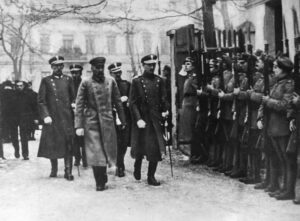
Meanwhile, on 13 January, Michał Sokolnicki, Piłsudski’s envoy to Paris, came to an agreement with Dmowski. The Warsaw delegation recognized the Polish National Committee in Paris as Poland’s foreign representation, while the Committee officially recognized Piłsudski as head of the Polish state. This formal agreement was to be signed the next day, but news from Warsaw about Paderewski’s mission as potential prime minister led both Warsaw and Paris delegations to postpone that meeting.
Paderewski undertook initial talks with the Socialists. On 9 November, he met a PPS leadership delegation including Tomasz Arciszewski, Rajmund Jaworowski, Feliks Perl, and Bronisław Ziemięcki. Paderewski told them that should Poland fail to form a coalition government, the Entente could refuse to provide food and other economic assistance. Fearing loss of influence among radical workers, the PPS delegation refused to support Paderewski’s mission. On 10 November, Piłsudski met Paderewski again at the Belvedere. Despite fears of the radical Left, Piłsudski could still count on his followers among the Socialists and on the personal popularity of Paderewski. On 12 January, Piłsudski received Zygmunt Sachnowski, a journalist from Kurier Poranny, a daily newspaper sympathetic with pro-independence Socialists. Sachnowski complained about People’s Militia activities that had left the paper’s current edition suspended for publishing a letter by Tadeusz Dymowski, an organizer of the failed early January coup. Piłsudski quietly moderated Sachnowski in his complaint, arguing that he would not support restricting freedom of the press, while telling him things were going in the right direction.
Piłsudski realized that, thanks to steps he had undertaken along with the Moraczewski government, the revolutionary fervor was being pacified. On 3 January, Piłsudski signed a decree on labor oversight and, five days later, he issued another decree concerning penal repercussions for interfering with parliamentary elections. Nevertheless, at street level, Warsaw remained excited by the failed coup. Some Socialist activists were reassured that the coup’s failure was a sign of the Moraczewski government’s strength; others were eager to intensify the “class struggle” against “reaction” and the “bourgeoisie”. Some Warsaw workers were ready to disarm Polish soldiers, but the PPS Central Committee issued an appeasing appeal. The Socialist paper Robotnik published an article in which the possible victory of Bolshevism in Poland was termed a new partition, this time inflicted by Germany and Russia. Although during a Warsaw meeting of the workers’ council on 14 January the PPS and the Polish Bolsheviks submitted different declarations – with the latter still calling for revolution – Socialist expectations that parliamentary elections would deliver satisfactory results prevailed. The major conflict in the workers’ council was the fact that PPS activists, even quite radical ones, wanted the councils to represent all workers, while the Communists wanted to make the councils their partisan organs.
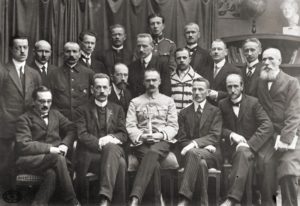
In early January 1919, the extreme Left rebelled in Berlin, thus Entente support was of increasing importance for Piłsudski. Secret talks concerning the formation of the Paderewski government finally leaked out to the press. Fearing an angry reaction in the streets, two Piłsudski followers from PPS, Baranowski and Witold Jodko-Narkiewicz, came to the Belvedere on 14 January. Piłsudski was sick again. His flu was back and he seemed very weak. Both Baranowski and Jodko-Narkiewicz argued that the Left’s reaction to reconstructing the government might be dangerous, and that instead of removing Moraczewski, Piłsudski should strengthen his position. Really angry, Piłsudski shouted:
You do not understand a thing from my situation and the entire situation in general. The Left and the Right do not matter. They may kiss my ass. I am for the whole [of the country]. What’s at stake is the army, which I still lack (…). The matter is Haller, Żeligowski, and only [the French marshal] Foch can arrange it. And can Moraczewski handle this? Can you see it? Wouldn’t Paderewski be better to talk to them, the man who speaks the same language?
Baranowski and Jodko-Narkiewicz still argued, and Piłsudski raised his voice again: “I am fed up with all this chatter, all this prompting! To hell with your advice–to hell, do you hear me? I need soldiers, do you understand?”
Even in extreme conditions, Piłsudski’s charisma allowed him to preserve the loyalty of his people. Moderate pro-independence Socialists supporting Piłsudski played a crucial role in these first two months after November 1918. While remaining true to their social and economic program, they overcame revolutionary foment in their ranks and marginalized Bolshevik influences. Almost two years later, one of Piłsudski’s top aides, Bogusław Miedziński, met a group of Polish Socialist military volunteers on the march to the front to counter the Red Army, and singing “The Internationale”, the Socialist anthem. He warned those soldiers that across the front line, they may hear the same song. “But we sing it in Polish”, was the Socialist commander’s reply. “And if you see them raise the banner WORKERS OF THE WORLD, UNITE!, what will you do?” asked Miedziński. The Socialist commander replied: “Then we’ll make ourselves a banner, STRANGERS KEEP OUT! [postronnym vkhod vosprashchayetsa].”
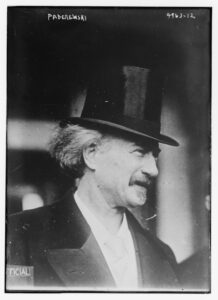
Piłsudski, realizing that the military was the top priority of the day, ordered on 15 January 1919 that a partial draft of the 1898 generation be held. On 16 January, he officially dismissed Moraczewski, expressing his gratitude for the dedication of the entire staff of his government, and appointing Paderewski as prime minister.
The Paderewski government included a number of politicians and experts whose reputation and skills were now crucial to continuing Piłsudski’s strategy. Paderewski took over foreign affairs. The crucial Interior Ministry was taken by Stanisław Wojciechowski, in his youth a Socialist, but later on cooperating with the Polish National Committee in Paris. Gen. Jan Wroczyński became minister of military affairs. He had been an officer in the Russian military, serving later in the First Polish Corps in Russia, and was briefly minister of the military in the Regency Council government of Świeżyński. Józef Englich, a Poznań-region lawyer and businessman, took the treasury portfolio. Another lawyer and freemason from POW, Leon Supiński, continued as justice minister. Kazimierz Hącia, who took over the Ministry of Trade and Industry, was also a Poznań-region lawyer and banker. The Ministry of Public Works was kept by Józef Pruchnik, an engineer connected with the Peasant Party leftists, while Jerzy Iwanowski, who became minister of labor and social affairs, had been a Socialist in his youth but later worked as an engineer and had been trade and industry minister in the Moraczewski government. A National Democrat, Stanisław Janicki, became agriculture minister. The minister of health, Tomasz Janiszewski, represented the moderate “Piast” Peasant party, while Antoni Mińkiewicz was nonaffiliated and a mining engineer, and continued as minister of supply distribution.
The new cabinet was varied among followers of National Democracy, conservatives, and the Peasants’ factions, and there were many nonpartisan experts and some Piłsudski followers. Although the PPS refused to take part in it, the Paderewski government could be called a broad coalition. Within a couple of days, Piłsudski wrote another letter to Dmowski, who was preparing for the Paris Peace Conference. Piłsudski informed him about the tense situation in Poland, where Socialists and National Democrats were still ready to jump at each other’s throats. He expressed hope that the Polish National Committee in Paris would not compete with the Warsaw government, but worried that parliamentary elections would not produce a stable majority. In that case, he wrote, he would step down unless the committee continued to only recognize itself as the foreign representation of the government.
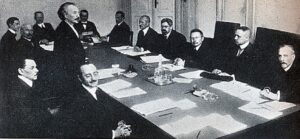
As a result, on 21 January 1919, Paderewski’s cabinet was recognized by the Polish National Committee, then by the victorious Entente, as the government of independent Poland. The first to do so was the US government, on 31 January, while the French and the British followed with some delay in February 1919. At the same time, right-wing pressure on the government diminished.
Piłsudski had explained his decision to appoint a new government in a letter to Dłuski, dated 17 January:
The present, professional government is first of all aimed at receiving Entente aid (…). Secondly, it should get out of the financial situation (…). The moral effect consists in the fact that by accepting his mission received from me, he [Paderewski] actually recognized my power as head of state and, secondly, by thanking the resigning cabinet, he recognized former developments in Polish politics, which is contrary to National Democratic critics.
The text is an excerpt from Wojciech Roszkowski’s book Master Game. Józef Piłsudski and the Rebirth of Poland, (Warsaw: Polish History Museum, 2021).
Author: Prof. Wojciech Roszkowski
Translation: Alan Lockwood

